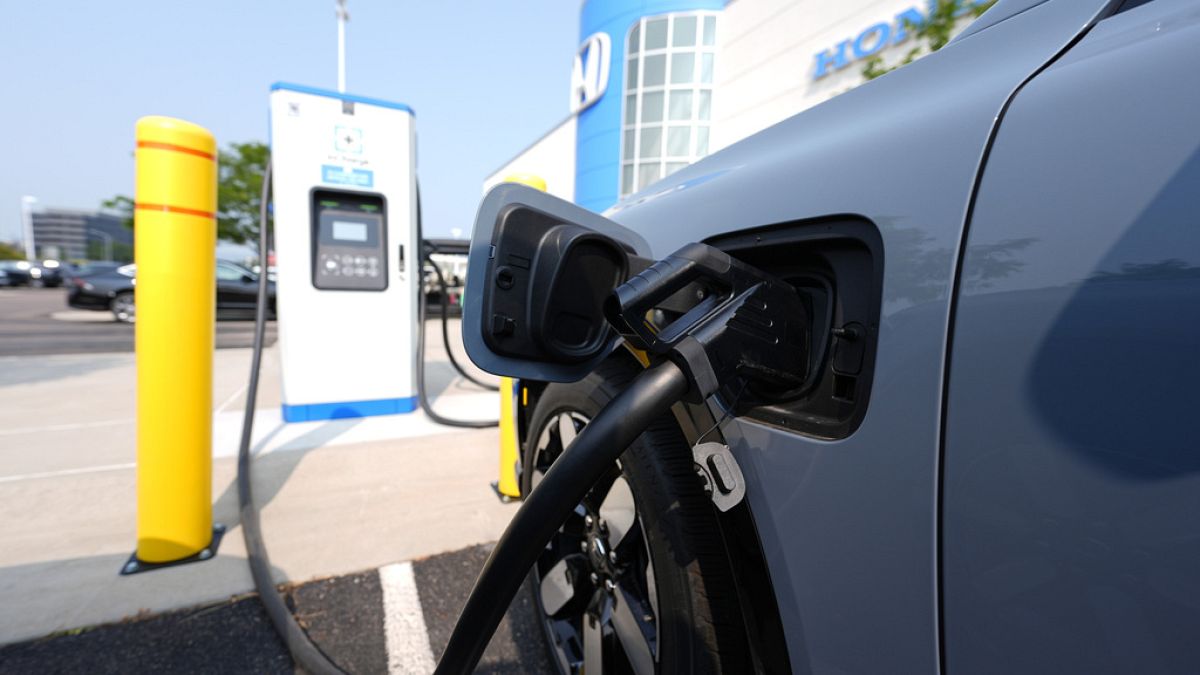The western Belgian port of Zeebrugge is experiencing a slowdown in demand for electric vehicles, leading to hundreds of EVs sitting idle in the car park waiting for buyers and drivers. With up to three million electric vehicles being transported annually through the port, it has had to make significant changes to accommodate the increasing number of EVs. This includes the construction of wind turbines for sustainable energy, on-site battery recharging options, a focus on quality control, and a thorough inspection process to ensure that cars are ready for immediate use upon delivery to customers. Anne Degrauw, a manager at ICO Terminals SA, emphasized that this shift towards electric vehicles represents the future of the automotive industry.
Despite the significant transformation of Zeebrugge’s port to cater to electric vehicles, there is reportedly an oversupply of EVs leading to rows of automobiles gathering dust in the car park. This oversupply issue is exacerbated by lower-than-normal EV registrations, which stood at 13.5% in July 2024. This figure pales in comparison to the high demand for gas-powered cars. François Simonart, a sales manager at ICO Terminals SA, noted that there has been an increase in the volume of electric cars coming from China post-COVID-19, as they are at the forefront of EV technology and have access to the necessary raw materials. However, this increase in volume has not translated into a corresponding rise in demand from buyers, leading to an accumulation of unsold EVs in the port’s car park.
The situation in Zeebrugge reflects a global trend of sluggish demand for electric vehicles, despite efforts to promote sustainable transport options. The shift towards electric vehicles is seen as integral to reducing carbon emissions and combatting climate change. However, challenges such as oversupply, lower registration rates, and limited consumer uptake hinder the growth of the EV market. To address these challenges, stakeholders in the electric vehicle industry must work together to create incentives for consumers, improve infrastructure for EV charging, and streamline the production and distribution processes to meet market demand effectively.
As electric vehicles become increasingly popular and affordable, policymakers and industry players must collaborate to overcome barriers to EV adoption. This includes implementing supportive policies such as tax incentives, rebates, and subsidies to encourage consumers to switch to electric vehicles. Additionally, investing in the development of charging infrastructure is crucial to alleviate range anxiety and promote widespread adoption of EVs. By addressing these challenges and fostering a supportive environment for electric vehicles, the automotive industry can accelerate the transition towards sustainable transportation and reduce reliance on traditional gas-powered vehicles.
In conclusion, the oversupply of electric vehicles in Zeebrugge’s port highlights the complex challenges facing the EV market, including lower-than-expected demand, registration rates, and consumer uptake. Despite efforts to promote sustainable transport options, such as electric vehicles, there is a need for coordinated action from policymakers, industry stakeholders, and consumers to drive the growth of the EV market. By creating incentives, improving infrastructure, and streamlining production processes, the automotive industry can overcome these challenges and accelerate the transition towards sustainable transportation. As the industry continues to evolve, collaboration and innovation will be key to unlocking the full potential of electric vehicles and driving towards a cleaner, greener future.









